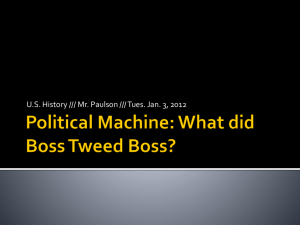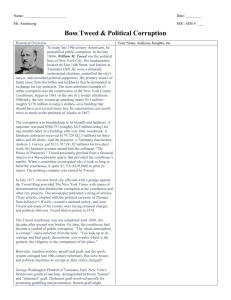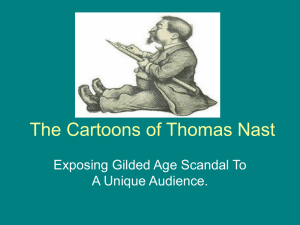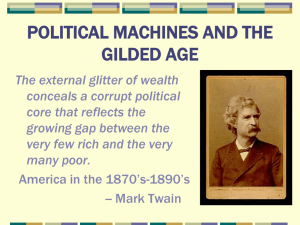AP US History
advertisement
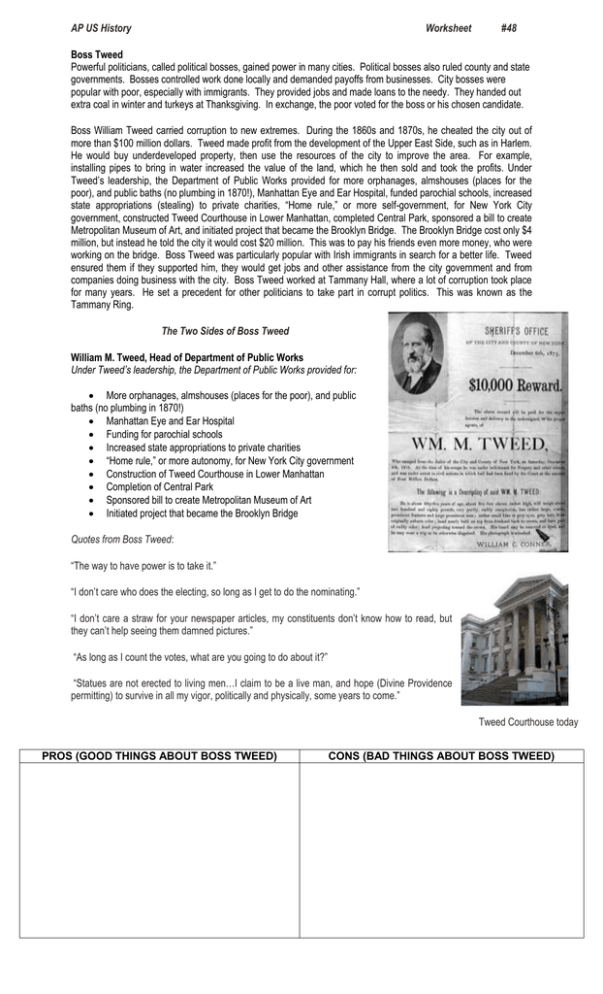
AP US History Worksheet #48 Boss Tweed Powerful politicians, called political bosses, gained power in many cities. Political bosses also ruled county and state governments. Bosses controlled work done locally and demanded payoffs from businesses. City bosses were popular with poor, especially with immigrants. They provided jobs and made loans to the needy. They handed out extra coal in winter and turkeys at Thanksgiving. In exchange, the poor voted for the boss or his chosen candidate. Boss William Tweed carried corruption to new extremes. During the 1860s and 1870s, he cheated the city out of more than $100 million dollars. Tweed made profit from the development of the Upper East Side, such as in Harlem. He would buy underdeveloped property, then use the resources of the city to improve the area. For example, installing pipes to bring in water increased the value of the land, which he then sold and took the profits. Under Tweed’s leadership, the Department of Public Works provided for more orphanages, almshouses (places for the poor), and public baths (no plumbing in 1870!), Manhattan Eye and Ear Hospital, funded parochial schools, increased state appropriations (stealing) to private charities, “Home rule,” or more self-government, for New York City government, constructed Tweed Courthouse in Lower Manhattan, completed Central Park, sponsored a bill to create Metropolitan Museum of Art, and initiated project that became the Brooklyn Bridge. The Brooklyn Bridge cost only $4 million, but instead he told the city it would cost $20 million. This was to pay his friends even more money, who were working on the bridge. Boss Tweed was particularly popular with Irish immigrants in search for a better life. Tweed ensured them if they supported him, they would get jobs and other assistance from the city government and from companies doing business with the city. Boss Tweed worked at Tammany Hall, where a lot of corruption took place for many years. He set a precedent for other politicians to take part in corrupt politics. This was known as the Tammany Ring. The Two Sides of Boss Tweed William M. Tweed, Head of Department of Public Works Under Tweed’s leadership, the Department of Public Works provided for: More orphanages, almshouses (places for the poor), and public baths (no plumbing in 1870!) Manhattan Eye and Ear Hospital Funding for parochial schools Increased state appropriations to private charities “Home rule,” or more autonomy, for New York City government Construction of Tweed Courthouse in Lower Manhattan Completion of Central Park Sponsored bill to create Metropolitan Museum of Art Initiated project that became the Brooklyn Bridge Quotes from Boss Tweed: “The way to have power is to take it.” “I don’t care who does the electing, so long as I get to do the nominating.” “I don’t care a straw for your newspaper articles, my constituents don’t know how to read, but they can’t help seeing them damned pictures.” “As long as I count the votes, what are you going to do about it?” “Statues are not erected to living men…I claim to be a live man, and hope (Divine Providence permitting) to survive in all my vigor, politically and physically, some years to come.” Tweed Courthouse today PROS (GOOD THINGS ABOUT BOSS TWEED) CONS (BAD THINGS ABOUT BOSS TWEED) George Washington Plunkitt George Washington Plunkitt was a Tammany Hall politician in the late 1800s and early 1900s. In speeches and essays, he describes actions taken by Tammany Hall to increase their power and line their pockets. In 1870, through a strange combination of circumstances, he held the places of Assemblyman, Alderman, Police Magistrate and County Supervisor and drew three salaries at once — a record unexampled in New York politics. While he was in the Assembly and the State Senate he was one of the most influential members and introduced the bills that provided for the outlying parks of New York City, the Harlem River Speedway, the Washington Bridge, the 155th Street Viaduct, the grading of Eighth Avenue north of Fifty-seventh Street, additions to the Museum of Natural History, the West Side Court, and many other important public improvements. He is one of the closest friends and most valued advisers of Charles F. Murphy, leader of Tammany Hall. --William Riordan, editor of Plunkitt of Tammany Hall What tells in holdin your grip on your district is to go right down among the poor families and help them. I've got a regular system for this. If there's a fire in Ninth or Tenth or Eleventh Avenue, for example, any hour of the day or night, I'm usually there with some of my election district captains as soon as the fire engines. If a family is burned out I don't I don't ask them if they are Republicans or Democrats, and I don't refer them to the Charity Organization Society, which would investigate their case in a month or two and decide if they are worthy of help about the time they are dead from starvation. I just get quarters for them, buy clothes for them if their clothes were all burned up, and fix them up until they get things runnin' again. It's philanthropy, but it's politics too - mighty good politics. Who can tell me how many votes one of those fires brings me? The poor are the most grateful people in the world, and, let me tell you, they have more friends in their neighborhoods than the rich have in theirs... --George Washington Plunkitt, Politician, New York, 1889 EVERYBODY is talkin’ these days about Tammany men growin’ rich on graft, but nobody thinks of drawin’ the distinction between honest graft and dishonest graft. There’s all the difference in the world between the two. Yes, many of our men have grown rich in politics. I have myself. I’ve made a big fortune out of the game, and I’m gettin’ richer every day, but I’ve not gone in for dishonest graft – blackmailin’ gamblers, saloonkeepers, disorderly people, etc. – and neither has any of the men who have made big fortunes in politics. There’s an honest graft, and I’m an example of how it works. I might sum up the whole thing by sayin’: “I seen my opportunities and I took ‘em.” Just let me explain by examples. My party’s in power in the city, and it’s goin’ to undertake a lot of public improvements. Well, I’m tipped off, say, that they’re going to lay out a new park at a certain place. I see my opportunity and I take it. I go to that place and I buy up all the land I can in the neighborhood. Then the board of this or that makes its plan public, and there is a rush to get my land, which nobody cared particular for before. Ain’t it perfectly honest to charge a good price and make a profit on my investment and foresight? Of course, it is. Well, that’s honest graft. --George Washington Plunkitt, Plunkitt of Tammany Hall, 1905 How does history portray Boss Tweed? Was the Tweed Ring ultimately good for New York?
